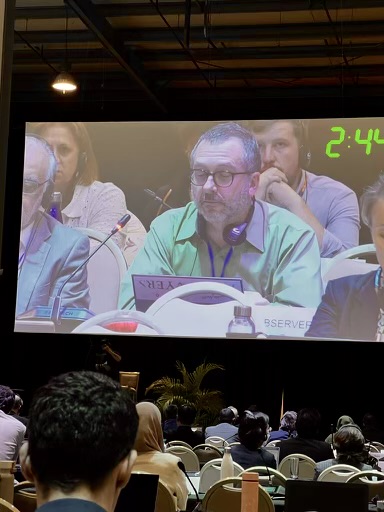ASH’s Policy Director Chris Bostic is attending the first Intergovernmental Negotiating Conference (INC-1) of the United Nations treaty to end plastics pollution in Punta del Este, Uruguay from November 28 – December 3, 2022. He will share updates and progress here for our community to stay engaged and informed.

December 1, 2022 – Today, ASH was able to make a second intervention during the plenary discussions on the role of nongovernmental stakeholders in negotiations going forward. Many thanks to our allies in the environmental coalition for their vital input.
Here is our intervention, to give you a taste of what ASH has been inserting into the formal discussions at INC-1, on behalf of all of you:
“Thank you, Chair. The discussions this week have been profound, mirroring the profound challenge we are here to face. I wish to again discuss an issue that has received increasing consideration but has yet to be dealt with directly – the role of stakeholders in these negotiations, and specifically the role of businesses that have profited while flooding the world with plastics. In that regard, I would like to call attention to the words of the honorable delegate from Canada, who noted the importance of learning from other processes.
Indeed, this body is not the first to face this issue, and we can look to historical processes to instruct our thinking. I believe two examples are most illuminating.
The United Nations Framework Convention on Climate Change was inaugurated 30 years ago with a mandate to tackle the biggest threat of our time. COP 27 was held in Egypt just a short time ago, and many people here today came directly from that meeting. After decades of misinformation and obfuscation, fossil fuel companies have been embraced in the FCCC process since the beginning and have spent untold resources influencing the discussion and outcomes. And what has been the result of 30 years of effort? Greenhouse gas emissions have increased virtually every year.
Juxtapose that with the experience of the WHO Framework Convention on Tobacco Control. Early in that process, the perpetrator of the tobacco epidemic, the tobacco industry, was formally excluded from participation, also after decades of misinformation and obfuscation. As a result, the FCTC has become an effective roadmap for national and regional action. Those countries that have fully implemented the FCTC – including our host country – have seen drastic reductions in tobacco use prevalence and many millions of lives have been saved.
In efforts to solve global problems it is no coincidence that allowing the involvement of those who have caused them has led to failure. The United Nations has adopted a Common Set of Exclusionary Criteria as part of its Guiding Principles on Business and Human Rights. This mechanism could be extremely helpful in creating deliberations free from conflict of interest and misinformation. Thank you.”
Keep reading about ASH’s work on plastics pollution <Return to Day 3 Blog Advance to Synopsis and Prospects Blog>



